Top Future Job Skills and Careers for Students in 2025

Rapid advances in technology, particularly AI and automation, are transforming the job market, and not without concerns. Many worry about the impact on job security as more tasks become automated.
Yet, the outlook isn’t all negative. The World Economic Forum projects a net increase of 78 million jobs by 2030, with demand shifting toward professionals who combine technical expertise, such as AI proficiency, with soft skills like leadership and analytical thinking.
This guide explores future-proof career paths, the key skills to develop, and how LIS can help you gain the expertise to stay competitive in a rapidly evolving workplace.
Table of Contents:
- 20 Essential Soft and Technical Skills for Future-Proof Careers
- Understanding Future-Proof Careers
- How LIS Can Help You Build Future Job Skills
- Gain Future Job Skills with LIS
These are the top skills of the future that every professional should have to ensure their competitiveness in the job market.
1. Digital Literacy
Digital literacy is imperative to staying in demand in the job market. This means staying updated on AI, data analytics, Blockchain, network security, and cloud computing. Whether you pursue a career in software development, business administration, finance, or a creative field, you still need to keep up with new technologies.
2. Critical Thinking and Problem-Solving
Critical thinking and complex problem-solving are among the top in-demand skills for future job prospects. Employers will want to know that you can analyse complex situations, develop innovative solutions, and leverage data-driven decision-making to lead organisations to success.
3. Emotional Intelligence (EQ) and Communication Skills
Emotional intelligence (EQ) and communication skills will help you understand other employees’ emotions in the workplace. You need strong interpersonal skills for collaboration and conflict resolution, especially if you want to launch a successful career in team management.
4. Adaptability
Future employers will value professionals who can easily adapt and are open to change. As industries, technologies, and workflows change, you must know how to keep up with transitions and pivot between roles or industries as the job market shifts.
5. Collaboration and Teamwork
To excel in any business environment, you need collaboration and teamwork expertise. These skills help you work effectively in diverse, cross-functional teams and hybrid work settings. These skills are more critical for professionals who want to become cross-functional leaders.
6. Data Literacy
Data is the new currency, and organisations will need professionals who can interpret and make decisions based on data. You must understand how data drives business decisions and performance data, and in some cases, be able to use data visualisation tools and analytics software. These analytical skills will keep you competitive in the job market.
7. Creativity and Innovation
Creativity and innovation are important skills because they position you as an innovative thinker who can develop new ideas, products, services and solutions. Employers will prioritise professionals who can think beyond traditional industries and systems and apply creative problem-solving to real-world challenges.
8. Leadership and Management Skills
Organisations increasingly need employees with expert leadership skills to help them align and guide teams to success. This includes knowing how to use empathy, transparency, and accountability in managing teams, project management, and resource optimisation.

9. Cultural Competence and Global Awareness
Cultural competence and global awareness are top social-based skills that can prepare you for future careers. Inclusivity and diversity are critical in the modern workplace, requiring you to understand and respect diverse perspectives and cultures and work in international and multicultural environments.
10. Entrepreneurial Mindset
An entrepreneurial mindset is essential for maintaining a competitive advantage in the job market. As industries and processes evolve, professionals must be willing to take risks and embrace uncertainty. They should recognise and seize business opportunities and create value in changing business environments.
11. AI and Automation Awareness
AI and automation will impact every industry. Around 60% of jobs will be affected by AI, highlighting the importance for professionals to know how this will influence their careers. As companies increasingly rely on these tools and software, it’s equally important to understand how to utilise automation solutions to enhance efficiency and stay informed about AI applications.
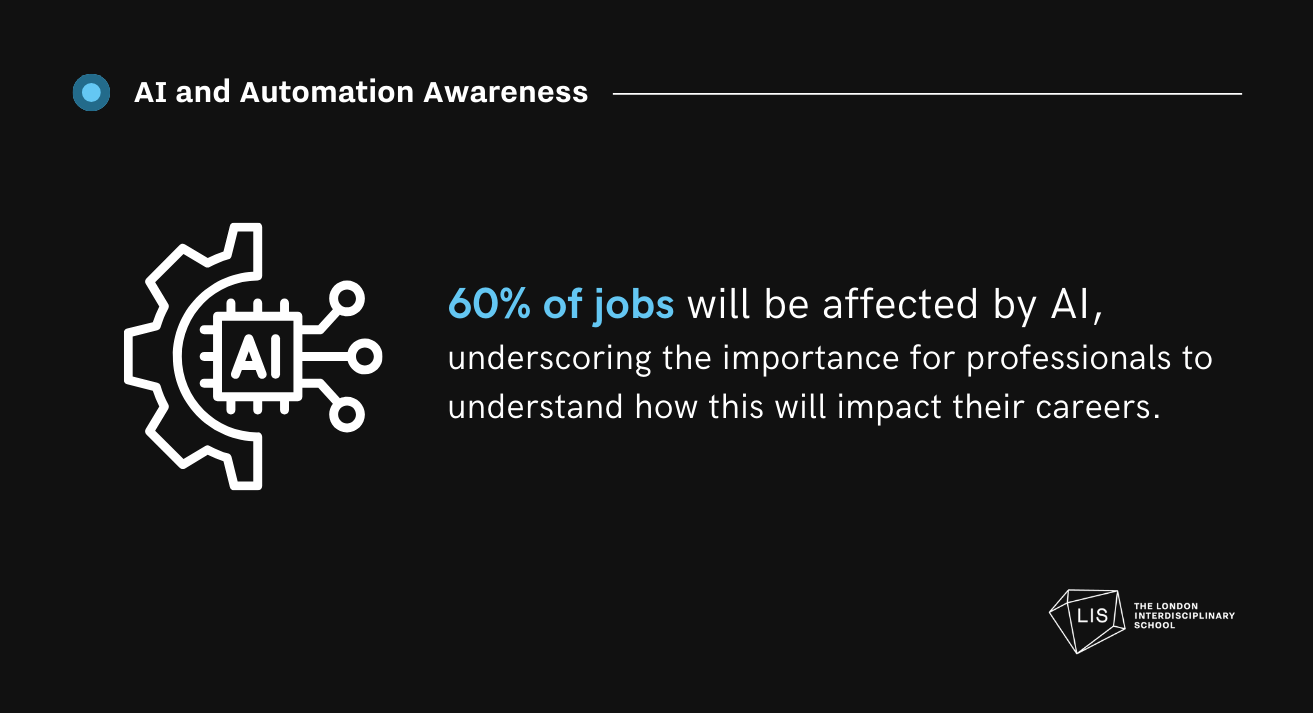
12. Financial Literacy
To ensure you future-proof your career, you must know how to manage budgets, forecast expenses, and make financial decisions based on in-depth economic analysis. It’s becoming increasingly important for professionals to understand financial statements and navigate financial risks, especially for aspiring industry leaders.
13. Technical Proficiency in Software Tools
It’s not only tech professionals who need technical proficiency in software tools; professionals in various fields also need these skills. Project management and collaboration software, such as Slack, Asana, and Microsoft Suite, are becoming increasingly popular among remote teams for automating workflows. Ensure you understand how to use these cloud solutions.
14. Negotiation and Persuasion Skills
Negotiation and persuasion are among the core skills needed to future-proof your career. Employers value professionals who know how to negotiate effectively with clients, stakeholders, and team members. Likewise, they want leaders who can persuade others to adopt ideas, products, and services and resolve conflict through diplomatic negotiation tactics.
15. Time Management and Organisational Skills
Unsurprisingly, time management and organisation are among the top skills for the future. From machine learning specialists and business leaders to accountants and film producers, employers want professionals who can prioritise tasks and meet deadlines. Understanding how to manage multiple priorities and use productivity tools to stay organised is critical.
16. Cybersecurity Awareness
Almost 70% of organisations are concerned that their employees lack cybersecurity awareness. You can stand out in the job market by understanding the basics of online security, data privacy, and compliance. In addition, you should know how to recognise threats like phishing, ransomware, and cyberattacks to ensure companies maintain a secure network infrastructure.
17. Customer-Centric Mindset
A customer-centric mindset goes beyond communication and interpersonal skills. You must identify customer needs, deliver personalised solutions, and design products, services, and experiences that enhance customer satisfaction. Employers increasingly require professionals who can build meaningful relationships and optimise their value.
18. Personal Branding and Online Presence
Every business needs effective branding to build an online reputation through platforms like LinkedIn and personal websites. Expand your professional development to new skills, such as effective networking, self-promotion, managing social media presence and helping organisations gain a competitive edge and establish a memorable brand identity.
19. Sustainability and Environmental Awareness
Consumers increasingly prioritise sustainability, with 72% of buyers willing to spend more money on sustainable products. Businesses need to respond to this shift by employing professionals who understand the impact of business practices on the environment, incorporate sustainable practices into their operations, and adhere to ethical business practices.
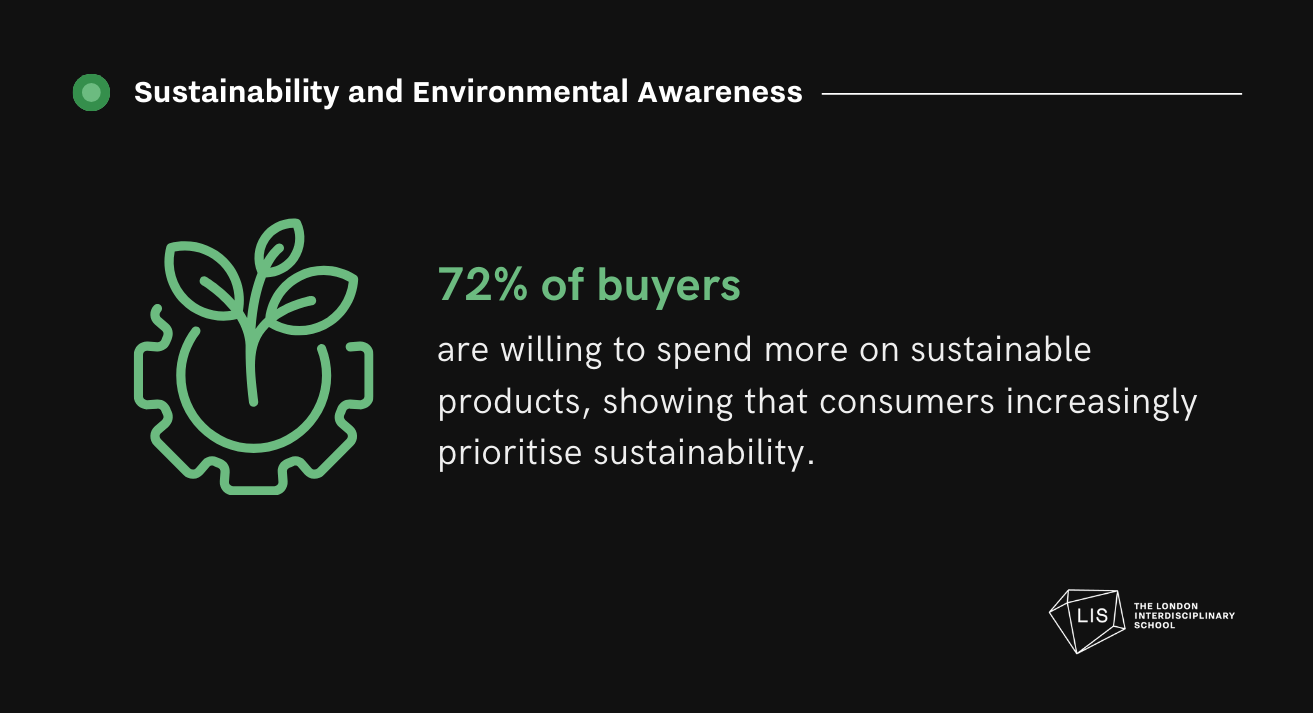
20. Continuous Learning
Continuous learning is a soft skill that is valued by businesses. Employers want a workforce passionate about lifelong learning, filling their skills gaps, and improving their professional expertise. The more you expand your knowledge, the more value you can deliver to organisations and maintain a future-proof career.
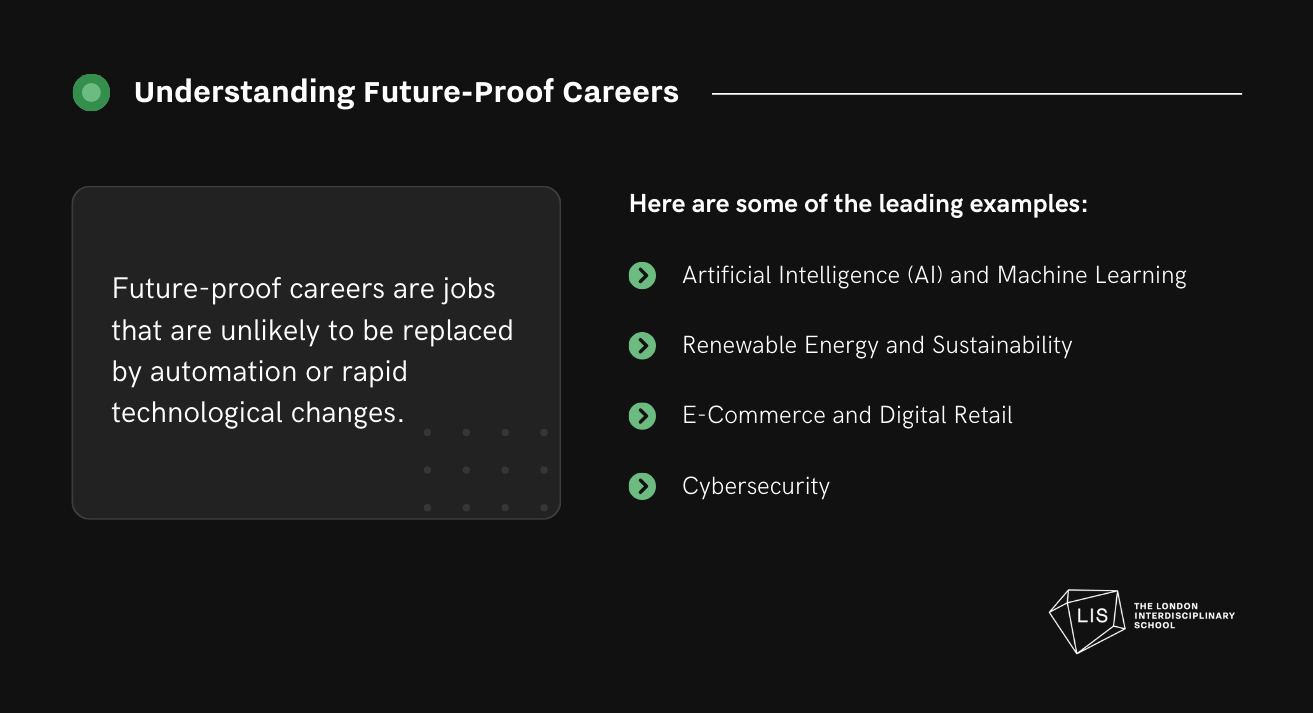
Future-proof careers are professions that are less likely to be replaced by automation or technological changes.
Here are a few examples of future-proof careers.
Artificial Intelligence (AI) and Machine Learning
The global AI market is projected to reach annual revenues of roughly $1.8 trillion by 2030.
This booming market is providing ample job opportunities for skilled professionals. In this sector, you’ll find employment in data science, data entry, data analysis, AI specialisation, and machine learning engineering, among other related careers.
Renewable Energy and Sustainability
2023 saw the highest ever growth in renewable energy jobs, expanding from 13.7 million to 16.2 million. This sector is rapidly growing as more organisations and consumers combat climate change and accelerate the adoption of clean energy solutions like solar, wind, and hydrogen. If you’re interested in this industry, there are opportunities in solar and wind energy installations, energy storage, and sustainable infrastructure.
E-Commerce and Digital Retail
Global e‑commerce sales reached approximately $6.09 trillion in 2024, an 8.4% increase over the previous year.
With more consumers shopping online, e-commerce and digital retail are future-proof industries in which to launch a career. Depending on your interests, you can consider working in digital marketing, supply chain logistics or e-commerce management.
Cybersecurity
Cybersecurity is undoubtedly one of the most reliable industries for securing your career in the future. The cybersecurity market is expected to reach $2.39 trillion by 2030, creating numerous employment opportunities for eligible professionals. The industry offers a huge variety of career options, from a job in cloud security to ethical hacking and cybersecurity analysis.
This is how LIS can help you get the skills you need to stay competitive in the job market.
Interdisciplinary Degree Pathways
A great way to develop skills that future-proof your career is through degree programmes and short courses. At LIS, we specialise in interdisciplinary learning to equip students with well-rounded skills they can easily transfer to any career.
Rather than focusing on one specialisation, a degree at LIS helps you develop core skills and competencies that every industry demands.
Our BASc degree is ideal for students who want to gain foundational interdisciplinary skills and launch their careers. Unlike most traditional bachelor’s degrees, you can choose modules and tailor your programme to achieve your career goals and pursue your interests.
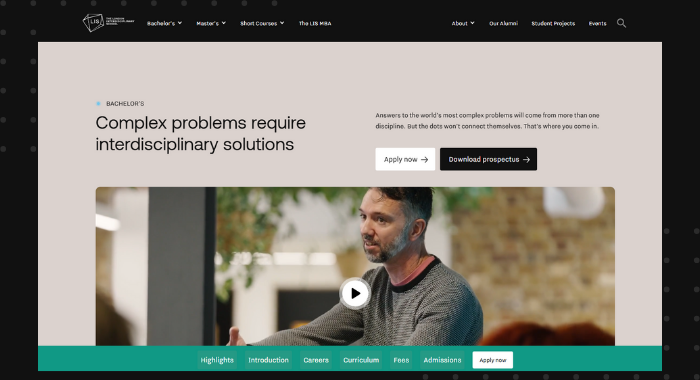
BASc Degree Overview:
- Duration: Three years of full-time study.
- Fees: £9,275 per year for home students and £17,000 per year for international students.
- Requirements: Completed application, dedicated and passionate about interdisciplinary learning, and an English Language Qualification if English isn’t your first language.
On the other hand, students who already have an undergraduate degree can opt for our MASc programme. This pathway focuses on helping you become a complex problem-solver and apply analytical thinking to create innovative ideas and solutions that lead businesses to success.
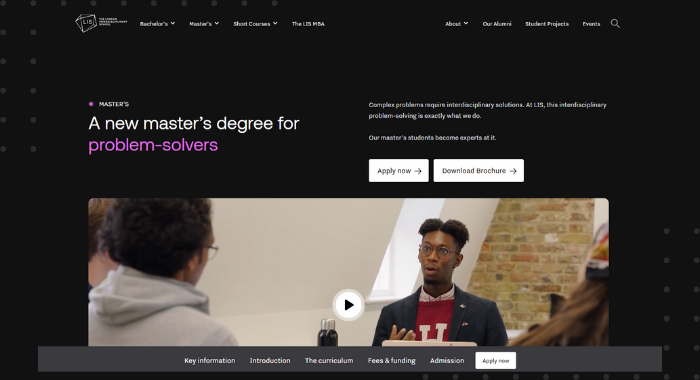
MASc Degree Overview:
- Duration: One year of full-time study or two years of part-time study
- Fees: £14,000 per year for full-time students, and part-time home students pay £7,000 per year. International students pay £25,000 per annum for full-time study and £7,000 for part-time study.
- Requirements: A 2:1 or above in an undergraduate degree from the UK or an international equivalent in any subject. Non-English speaking students also need an English Language Qualification.
Internships and Networking
There’s no better way to gain the soft and technical skills you need to future-proof your career than hands-on experience. At LIS, we offer eligible students the opportunity to complete summer internships for at least five weeks. You can gain practical experience working in various sectors while receiving payment for your hours worked.
In addition to internships, you can gain future job skills through our networking opportunities. LIS students join a supportive community of change-makers of more than 200 employers and organisations. Besides internships, you can also visit these businesses to understand what expertise they value and how you can achieve those skills.
Financial Support Resources
At LIS, we understand that not every student can access high-quality education to gain future job skills. As a result, we offer financial and well-being support resources, making advanced education more accessible to students from diverse backgrounds.
Our financial resources include scholarships and other financial support options:
- BASc Future Leaders Scholarship: Qualifying undergraduate students with noticeable leadership potential can receive a 50% tuition discount.
- MASc Innovation Scholarship: Eligible students passionate about innovation, entrepreneurship, or intrapreneurship can receive up to £5,000.
- Financial Support Bursary: LIS offers eligible students bursaries between £1,000 and £7,000 per annum. This bursary is awarded based on household income, care experience, estrangement, and other severe circumstances.
- Hardship Grants: Students who face unexpected financial hardship can apply for a hardship grant.
- The LIS Foundation: This charity offers up to £1,000 bursaries for low-income households.
Future-proof careers are still attainable, despite technological advancements, but it helps to acquire skills that keep you ahead of shifts in the job market.
To start, consider building expertise in creative thinking, leadership development, risk management, time management, negotiation, AI and automation, and cybersecurity. You should also prioritise active learning, have cultural competence to establish a positive work environment, and develop an entrepreneurial mindset.
At LIS, our interdisciplinary degree programmes, financial resources, and internships can help students gain the skills they need to stay competitive in the job market.
Ready to get the skills you need to succeed? Contact LIS today.
Share this story
Sign up for our newsletter
Don't miss out on important updates including course information, new announcements, Open Day dates and the latest LIS news.

.png)











































.svg)

.svg)









.webp)
This is a comment related to the post above. It was submitted in a form, formatted by Make, and then approved by an admin. After getting approved, it was sent to Webflow and stored in a rich text field.